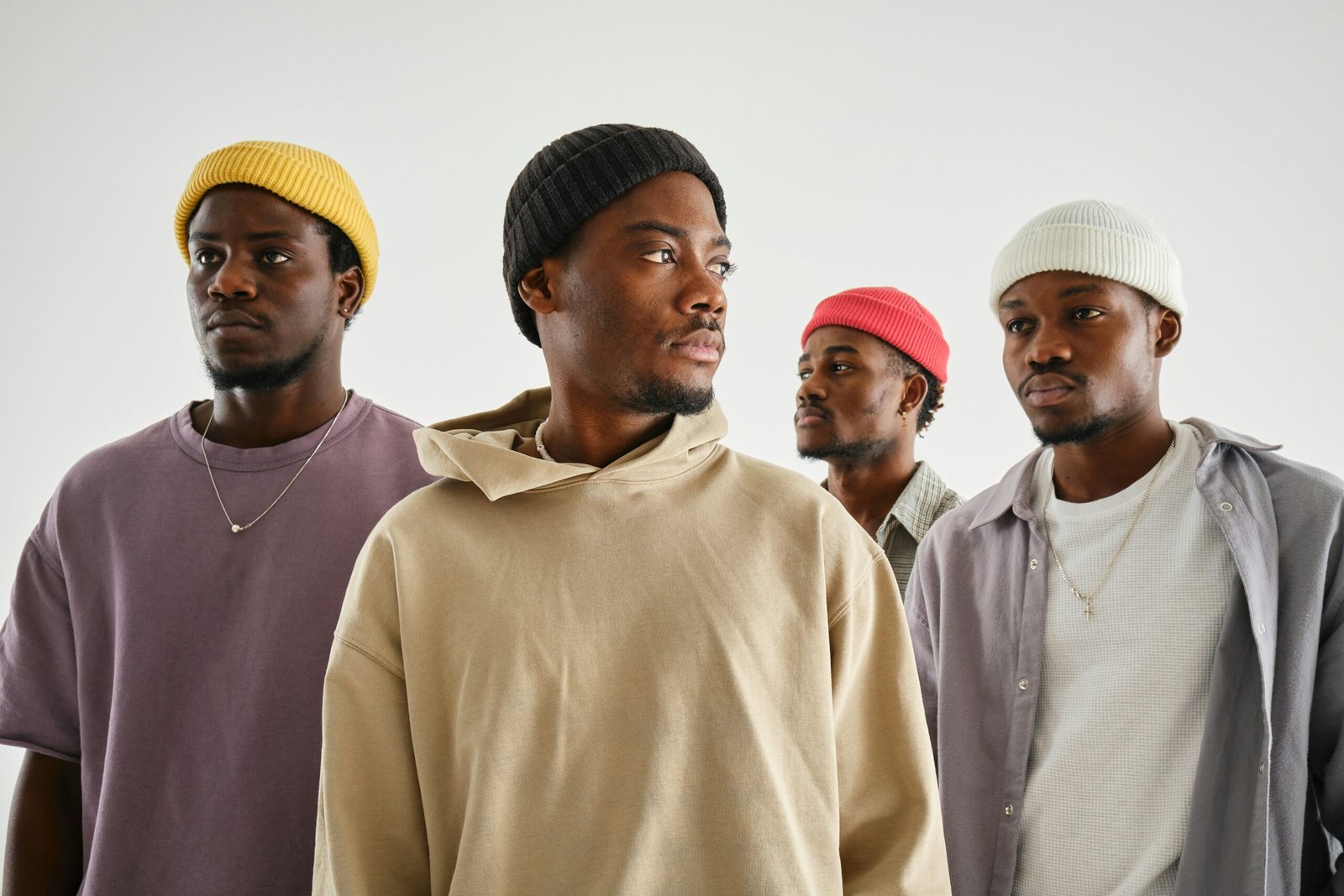When Men Cry
I now understand that crying is nothing to be ashamed of, but rather a natural part of being human. However, it was not always the case. Crying gives us an opportunity to process difficult emotions and emerge stronger than before. When we allow ourselves to freely express our feelings, we become kinder and more compassionate both towards others and ourselves. #InLakech

We live in an era where men are expected to be tough, indifferent, and emotionally numb. But resilience isn’t the absence of sadness—it’s the ability to move through it. Courage isn’t about shutting down emotions—it’s about facing them. It’s time to bring down the barriers that limit men from freely expressing themselves. From the classroom, field, boardroom, to our homes, it’s time to challenge the stigma around crying as a form of weakness. To access our inner strength and humanity, we need not lock away our emotions, but rather embrace them. Men do cry – and it’s time we acknowledge it without shame or judgment. I say this now with confidence, but that wasn’t always the case.
Society trains men not to feel. We are taught that emotions make us “less strong,” a sign of vulnerability and weakness. But the truth is, ignoring our feelings can do far more harm than good. Repressing emotions can lead to mental health issues like depression and anxiety, making men unable to cope with everyday issues, ask for help, or express ourselves. As a psychologist, I see this in my work every single day. Even though crying is a perfectly normal human expression and can be liberating, allowing us to process and release tension, giving us the space we need to heal, it is not something that comes naturally to many men. We have learned to mask our emotions and at times, we might believe we have lost the capacity or were never given the tools to express what we feel.
I recognize that even after becoming a mental health provider, expressing emotions was something I struggled with. I literally went to therapy for the first time to learn how to cry. The first time I entered a counseling session as a client, it was filled with an overwhelming mix of emotions. I felt apprehensive and anxious about what to expect, uncertain of how the session would unfold or how revealing my thoughts or even worse, my emotions might be. I worried I would show a complete stranger parts of me I was not ready to bear witness to myself. I went to my first counseling session after being a therapist for five years. It was ironic that I believed in my product, had seen first-hand how it could change lives, improve relationships, and heal past and present wounds, yet in my mind, it was not meant for me. Maybe it was that I didn’t think my problems were bad, important, or worthy enough to take up space in a therapy session. Thinking back on it, I wish I had given myself the opportunity sooner.
When I finally decided to go, I came in with an agenda and clear plan of attack:
1. I knew I had ADHD. I had never been officially diagnosed but was a walking poster board for all the challenging and wonderful characteristics of an ADHD soul.
2. I felt like an impostor in one of the top counseling psychology programs in the United States. I was struggling to keep up with all the requirements and expectations and in some ways, it felt trivial to write papers when I knew my community was under xenophobic attacks. I felt like I needed to do more and academia just moved to slow for me. After all I was an activist before I ever was a scholar.
3. I was unable to cry even when I recognized something was breaking my heart; therefore, I felt like there was something wrong with me. I’ll share more about ADHD and my academic experiences on later blogs. For this one I will focus on the latter, learning how to cry.
I remember starting counseling services and having my therapist tear up as I told them my migration and life-story. In my mind, it was the ultimate sign I had given them too much. I viewed it as a testament to my broken state; after all, even other people could cry to my story while I couldn’t feel hard or long enough to shed a tear. My therapist processed with me what was going on, helped me debrief what was coming up for me, and helped me normalize and validate my experience. She also helped me understand the ways in which my inability to cry had become a defense mechanism and survival strategy. It’s not an easy thing, to learn how to cry as a man, especially not when we can almost count the number of times we remember doing it in our hands.
We are taught from a young age that it is not something to be done in public, or to be taken lightly. But the truth is, tears are powerful; they are the manifestation of our inner turmoil and hidden emotions. Letting ourselves feel, however difficult, can bring us clarity and peace. However, how do we do something we were not given permission to do? As boys we were taught to be tough and resilient, discouraged from displaying vulnerability or sensitivity. This programming establishes an inflexible barrier that conceals the complexity of emotions that are what it means to be human. As a result, men often find themselves trapped in a cycle of repression, unable to fully process and express their feelings.
In my undergraduate years at San Jose State University, I help create an organization called Men Creating Change. It was an organization for men to serve as allies to others and to help with men’s mental health. We had learned early on that men were only given permission to feel a limited number of emotions that were deemed acceptable in our society. The emotions were: anger, hunger, happiness (until a certain point), and sexual desire. Feeling anything else would make us less of a man. I would later learn that this was the framework developed by Tony Porter, a well-known educator, activist, and co-founder of A Call to Men, an organization that promotes healthy masculinity and gender equity. The consequences of this emotional confinement can be severe, leading to increased stress, anxiety, depression, and even suicide. It’s okay to be vulnerable and open about our struggles; in fact, it’s absolutely essential. Men should embrace their emotions and have the courage to be authentic in every aspect of life. However, most of us live trapped in a box that tells us what we are allowed or not allowed to feel.
In my work as a psychologist, speaker, author, and healer I’ve focused part of my practice on masculinity and men’s issues in part because I never felt I could find a space that could hold that part of me. I’ve had other men come up to me after keynotes or workshops to accuse me of making men weaker by trying to get them to “step away from what it means to be a real man” or “taking away their power to be men in all the ways they need to” to which I have responded that having a full range of emotions only helps us be more authentic and real. Contrary to popular belief, vulnerability is not a sign of weakness but a testament to strength. Allowing oneself to be vulnerable requires immense courage, and self-awareness. By redefining masculinity to include emotional openness, we can create a more compassionate and inclusive definition of what it means to be a man. Men deserve to be seen and heard, without the burden of conforming to outdated expectations that only serve to stifle their emotional growth and ability to show up fully in their lives and relationships.
Thanks to that first counseling experience and the love and acceptance from many loved ones since, especially my wife, I have learned to embrace the softer and more gentle parts of me. I’ve learned to see the beauty in expressing emotions and sharing what I feel. It has not been and easy or a quick fix. I continue to work and grow in this area of my life and I have to commit to it for the rest of my life. I hope we can do better for the next generation of men. I hope to do better for my daughter, the kids of the people I love, and our descendants. They deserve better than we got, and we will only change this by taking an active part in changing the way things are, by challenging what’s acceptable and embracing the many forms of masculinity.
A Call to Action: Empowering Men to Seek Help
It’s time for society to come together and support men in their journey towards emotional well-being. By normalizing the expression of emotions and providing accessible mental health resources, we can empower men to seek help when needed. Let us create a world where men no longer feel the need to hide their tears but, instead, find strength in embracing their emotions and supporting one another.
Finally, it is imperative that we challenge the societal expectations that force men to suppress their emotions. By dismantling the stigma and fostering emotional authenticity, we can pave the way for healthier and more fulfilling lives for men. It’s time to stand together, acknowledge the power of vulnerability, and create a culture where men are free to express their emotions without shame or judgment. With that said check in on the men in your life behind being okay might be a hidden set of emotions or if you are a man struggling with your mental health please reach out to a mental health professional that can support you in your journey.
Global and National Organizations Supporting Healthy Masculinity
1. A Call to Men
Focus: Educates men and boys on healthy, respectful manhood while addressing violence against women and marginalized groups.
Website: www.acalltomen.org
2. Men Engage Alliance
Focus: A global network promoting gender equality and healthy masculinities to reduce gender-based violence and inequality.
Website: www.menengage.org
3. Movember Foundation
Focus: Tackles men’s health issues like mental health, suicide prevention, and prostate cancer, emphasizing emotional vulnerability and peer support.
Website: www.movember.com
4. The Good Men Project
Focus: Offers a platform for men to explore issues around masculinity, relationships, and mental health through storytelling and dialogue.
Website: www.goodmenproject.com
5. ManKind Project
Focus: Provides workshops and support groups to help men redefine masculinity and develop emotional intelligence.
Website: www.mkp.org
6. White Ribbon Campaign
Focus: Engages men and boys in preventing violence against women and promoting gender equality through advocacy and education.
Website: www.whiteribbon.ca
BIPOC Men Focused Efforts
1. The Confess Project
Focus: Empowers men of color through mental health advocacy and emotional expression, often using barbershops as safe spaces to redefine masculinity and discuss emotional well-being.
Website: https://www.theconfessprojectofamerica.org/
2. BEAM (Black Emotional and Mental Health Collective)
Focus: Works to remove the stigma around mental health in Black communities, including programs for Black men to embrace emotional well-being and redefine masculinity.
Website: www.beam.community
4. Forward Promise
Focus: Advocates for the health and well-being of boys and young men of color, addressing systemic inequities, mental health, and masculinity.
Website: https://forwardpromise.org/
5. BMe Community
Focus: A network of Black men and women committed to redefining Black masculinity through leadership, storytelling, and community building.
Website: www.bmecommunity.org
6. Native Wellness Institute
Focus: Works to reclaim traditional Indigenous values around masculinity and community through workshops, retreats, and cultural revitalization.
Website: www.nativewellness.com
7. MenHealing
Focus: Offers support for male survivors of sexual trauma, with a focus on men of color, by creating safe spaces to process trauma and redefine masculinity.
Website: www.menhealing.org
8. Barbershop Books
Focus: Uses barbershops to create culturally meaningful literacy experiences for young Black boys, fostering spaces where boys can embrace learning, mentorship, and emotional development.
Website: www.barbershopbooks.org
9. National Compadres Network
Focus: Works with Latino and Indigenous men to promote a “compadre” model of mentorship, emotional healing, and community connection.
Website: www.nationalcompadresnetwork.org




